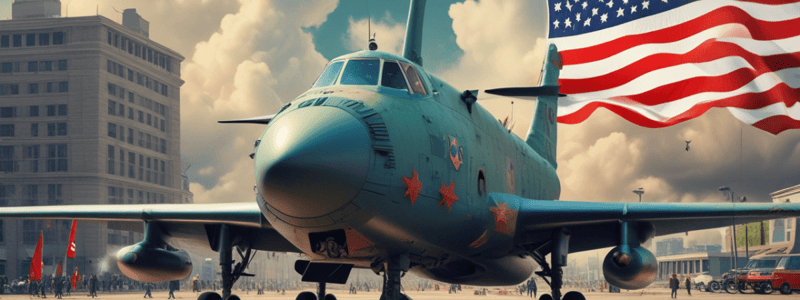Podcast
Questions and Answers
What term is George Orwell believed to have coined in 1945?
What term is George Orwell believed to have coined in 1945?
Cold War
What was a key factor leading to the Cold War in Europe after World War II?
What was a key factor leading to the Cold War in Europe after World War II?
Division of Germany
What event highlighted the struggle between the United States and the Soviet Union during the Cold War?
What event highlighted the struggle between the United States and the Soviet Union during the Cold War?
Berlin Airlift
Which organization was established to strengthen Western countries against Soviet influence?
Which organization was established to strengthen Western countries against Soviet influence?
When did the Soviet Union develop its first nuclear weapons?
When did the Soviet Union develop its first nuclear weapons?
What was President Truman's precaution during tensions with the Soviet Union in response to the threat of atomic warfare?
What was President Truman's precaution during tensions with the Soviet Union in response to the threat of atomic warfare?
What characterized the Cold War in terms of the battle between the United States and the Soviet Union?
What characterized the Cold War in terms of the battle between the United States and the Soviet Union?
What was the purpose of forming the ECSC (European Coal and Steel Community)?
What was the purpose of forming the ECSC (European Coal and Steel Community)?
What was the Soviet Union's response to NATO and ECSC?
What was the Soviet Union's response to NATO and ECSC?
What fueled the Cold War between the Western world and the Soviet Union?
What fueled the Cold War between the Western world and the Soviet Union?
Which event in Asia saw the US and Britain intervene to prevent the spread of communism?
Which event in Asia saw the US and Britain intervene to prevent the spread of communism?
Which country emerged as a success story of capitalism during the Cold War?
Which country emerged as a success story of capitalism during the Cold War?
What aspect of the Cold War saw the US and Soviet Union competing for technological superiority?
What aspect of the Cold War saw the US and Soviet Union competing for technological superiority?
In which year did the US achieve the milestone of landing the first men on the moon?
In which year did the US achieve the milestone of landing the first men on the moon?
What did the US landing on the moon symbolize in the context of the Cold War?
What did the US landing on the moon symbolize in the context of the Cold War?
Flashcards are hidden until you start studying
Study Notes
- George Orwell is believed to have coined the term "Cold War" in 1945, a conflict that lasted for most of the second half of the 20th century between the United States and the Soviet Union.
- The Cold War was characterized by a battle for supremacy and world power, with disputes over economic systems, international influence, and the fear of nuclear attacks that could destroy entire nations.
- The division of Germany after World War II, with the Western half under Allied control and democracy, and the Eastern half under Soviet control and communism, was a key factor leading to the Cold War.
- Tensions escalated with the division of Berlin, leading to the Berlin Airlift as a response to Stalin cutting off Western access to the city, highlighting the struggle between the two superpowers.
- Nuclear weapons also played a significant role in the Cold War, with the threat of atomic warfare present from the beginning and President Truman staging planes in Britain as a precaution during tensions with the Soviet Union.- The Soviet Union developed its first nuclear weapons in 1949, marking the start of the arms race as countries competed to build more advanced atomic weapons to secure victory in a potential nuclear conflict.
- In response to the Soviet advancements, Western powers established NATO (North Atlantic Treaty Organization) to strengthen Western countries against Soviet influence. Additionally, they formed the ECSC (European Coal and Steel Community), which later evolved into the European Union, to connect Western European countries economically and prevent future wars.
- The Soviet Union countered NATO and ECSC by creating the Warsaw Pact, uniting Eastern European countries under Soviet control to protect against Western advancements, setting a pattern of power struggle during the Cold War.
- The Cold War was fueled by differences in economic systems, with the Western world operating on capitalism and the Soviet Union adhering to communism, leading to ideological clashes and a moral obligation for the Western powers to contain the spread of communism.
- The Cold War extended beyond Europe, with significant events in Asia, such as the Korean War where the US and Britain intervened to prevent South Korea from falling to communism, resulting in millions of casualties.
- Japan emerged as a success story of capitalism during the Cold War, with US support driving its economic growth and transformation into the world's second-largest economy through resilience and innovation.
- The Space Race became a critical aspect of the Cold War, with the US and Soviet Union competing for technological superiority and global influence, culminating in the US landing the first men on the moon in 1969, marking the end of the Space Race and a victory for the US in the battle for technology and development.
Studying That Suits You
Use AI to generate personalized quizzes and flashcards to suit your learning preferences.




